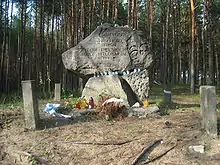Wilhelm Trapp
Major Wilhelm Gustav Friedrich Trapp, nicknamed Papa Trapp by his subordinates,[1] (4 September 1889 – 18 December 1948) was a German career policeman who commanded the Reserve Police Battalion 101 formation of Nazi Germany's uniformed police force known as the Order Police (Ordnungspolizei). The Battalion was the subject of Christopher Browning's Ordinary Men.
Wilhelm Gustav Friedrich Trapp | |
|---|---|
| Born | 4 September 1889 |
| Died | 18 December 1948 (aged 59) |
| Cause of death | Execution by hanging |
| Political party | Nazi Party |
| Criminal status | Executed |
| Conviction(s) | War crimes |
| Criminal penalty | Death |
| Police career | |
| Allegiance | |
| Service/ | |
| Years of service | July 1942 – November 1943 |
| Rank | Major |
| Commands held | Reserve Police Battalion 101 |
A World War I veteran, recipient of the Iron Cross First Class, and an "old Party fighter", having joined the NSDAP in December 1932,[2] Trapp served in occupied Poland during World War II, subsequently leading his battalion of nearly 500 middle-aged men from Hamburg on genocidal missions against the Polish Jews.[3]
He was captured after the war by the Allies and handed over to the British authorities. After investigation by the Polish Military Mission he was extradited to Poland in 1946, and charged with war crimes. Trapp was found guilty and sentenced to death by the Siedlce District Court on 6 July 1948,[4][5] and executed on 18 December 1948, along with fellow officer Gustav Drewes.[6]
Excerpts

The killing of 1,500 of the 1,800 Jews from Józefów (other names: Józefów Biłgorajski, Józefów Ordynacki, Józefów Roztoczański) located twenty miles southeast of Biłgoraj in Distrikt Lublin on 13 July 1942 [7] was performed by German (Ordnungspolizei) policemen: the 1. Company, and, mostly, by the three platoons of the 2. Company. Trapp gave his commanders their respective assignments before the operation:[8]
"The men were explicitly ordered to shoot anyone trying to escape. The remaining men were to round up the Jews and take them to the marketplace. Those too sick or frail to walk to the marketplace, as well as infants and anyone offering resistance or attempting to hide, were to be shot on the spot".
The bodies of the dead carpeting the forest floor at the Winiarczykowa Góra hill (about 2 km from the village) were left unburied.[9] Watches, jewelry and money were taken.[10]
The Reserve Police Battalion 101 left for Biłgoraj at 9 pm.[11] According to one policeman, Trapp told him "Man, … such jobs don't suit me. But orders are orders." Trapp later remarked to his driver: "If this Jewish business is ever avenged on earth, then have mercy on us Germans."[12]
Notes
- Browning (2017), p. 7.
- Browning (2017), p. 64.
- Browning (2017), pp. 69–76.
- Trials (Sygn. GK 284), Trapp Gustaw: File SOSBP 45. Protocols. Siedlce (Poland) Sąd Okręgowy: Instytut Pamięci Narodowej; Komisja Ścigania Zbrodni przeciwko Narodowi Polskiemu, ul. Towarowa 28, Warsaw, Poland. PDF file from ushmm.org; retrieved 3 December 2014.
- Dokumentationszentrum für Kriegsverbrecherprozesse (ICWC): Polen Philipps-Universität Marburg - ICWC.
- Struan Robertson. "Hamburg Police Battalions during the Second World War". Archived from the original (Internet Archive) on 22 February 2008. Retrieved 24 September 2009.
- Browning (2017), pp. 7–8.
- Browning (2017), p. 81.
- Robert Kuwalek, Chris Webb (2007). "Jozefow". Holocaust Research Project.org. Holocaust Education & Archive Research Team. Retrieved 17 June 2014.
- Marta Kubiszyn (2014). "Józefów. Lata okupacji". Virtual Shtetl.org. Muzeum Historii Żydów Polskich. Retrieved 17 June 2014.
- Browning (2017), p. 102.
- Browning (2017), p. 83.
References
- Browning, Christopher R. (2017) [1992]. Ordinary Men: Reserve Police Battalion 101 and the Final Solution in Poland (revised ed.). Harper Perennial. ISBN 9780062303028. See also Penguin Books edition.
- Goldhagen, Daniel J. (1997). Hitler's Willing Executioners: Ordinary Germans and the Holocaust. Abacus. ISBN 978-0349107868.